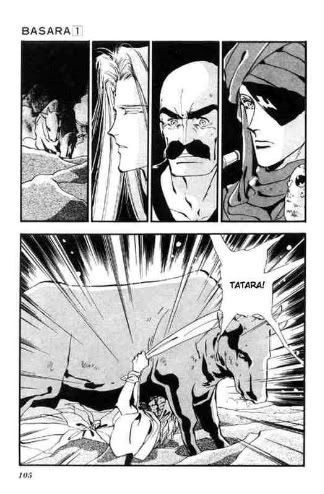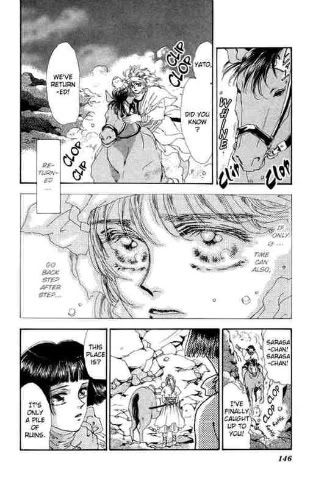 Well it's finally the last volume of Basara. Another collection of short stories, but in this volume we actually see what happened to Shuri and Sarasa.
Well it's finally the last volume of Basara. Another collection of short stories, but in this volume we actually see what happened to Shuri and Sarasa.The first short story deals with Sarasa and Shuri right after the war has finished; both have lots of baggage and can't seem to be able to deal with each others issues. Shuri decides to travel with Sarasa and they end up in Huang Empire, which is going through similar experiences as those that happened in Japan.
Slowly they begin to open up about topics the other refused to speak of; Shuri about Shido and his life as the Red King, and Sarasa about Ageha and what the Red King did to her that fateful day. Sarasa realizes she was not helping Shuri with her fears of his frailty and Shuri realizes that he cannot solve everything with violence. The story ends with the two lovingly embracing once more.
The next story is a two page look into Shinbashi, Sarasa's owl. It's short, but adorable. The story following it features Tamon and Masunaga when they were younger and took the rite of obtaining the Genbu sword with two other boys. This story shows a far more interesting side of Tamon, and why he personifies what the Genbu sword stands for, and that is abhorrence to killing.
Then we have two more very short stories. The first features Hachiya, the leader of the Yarogumi, and his motivation for serving the monarchy. The second shows us a typical morning for Sarasa and Shuri in their travels. Sarasa reminisces about everyone with Shuri. His response to certain characters (ASAGI) are funny.
The final story is Walnut and it features a much older Hayato as he struggles to discover what he should be doing with his life. He meets up with two children with an uncanny resemblance to Tatara and Shuri. He is then finally able to realize his country needs him and that he can help Japan, and thus finally accepts the position of leader to be the intermediary between the different regions of Japan.
The appendix also has a short story called Sarasa that takes place before the catastrophe.
Wow, I cannot believe it is the final volume of Basara. It's been quite the ride and I really enjoyed it. This volumes ties up Sarasa and Shuri's life after the war very well. It ties up loose ends about each one's emotional scars that were never fully closed between the two at the ending.
I was kind of shocked to see a story about Tamon and Masunaga, as well as Hachiya, as these three were rather neglected, Masunaga and Hachiya in particular. But nevertheless I welcomed both stories, because Tamura-san always has interesting character building stories. The friendship between Masunaga and Tamon, which was passingly mentioned in the main story, was given a beautiful dimension in this short story. Not only do we learn that Tamon is not just a goofy fishing fanatic, but actually wise beyond his years, but also that Masunaga was able to appreciate the lesson Tamon taught him and the other two boys and this was the foundation of his friendship with Tamon.
Hachiya's story was very touching and humanized his character incredibly. His sorrow at his parent's wasting away and their unending and unfulfilled hope as well as his inability to understand this hope in the royal family was softly presented as he watched his mother ironing his father's Hakama pants. The real impact, however, is only felt when Hachiya accepting the job in the Yarogumi finally connects with his parents feelings and says he can now love the royal family. My interpretation of this crucial moment is that his love of the royal family stems from the fact that they allowed what his parents have always hoped for and believed to come true. In one of the most touching panels, Hachiya tells his parents that he has finally been admitted into the yarogumi and hopes they are happy. Phantoms of his parents grasp his hands in gratitude. What they hoped for has came to pass before they were able to witness it and Hichiya wants to live their dreams out and this is his the root of his loyalty to the royal family.
Hayato was another character I did not think would get the amount of devoted space for his story that he did. Although, his story also encompassed a lot of other stories as well, the amount of character development that was given to him in his story was well beyond what I would have ever expected. Hayato in essence grew up in his story; he was still a lost young man, but thanks to a few children he was able to come to see that he too can do something for Japan and he does have the ability to accomplish it. One of my favourite aspects of Walnut, Hayato's story, was that we got to see all the children a little older. It was interesting to see how they grew up and whether they were like their parents. Raita, Raizo's son was as impulsive as him, but seemed to be a bit more laid back (since he teases Motomichi). Motomichi was almost an exact replica of Shido, except he isn't training to be a solider, but a civil servant. Ayumu looks like Shuri and seems to have his arrogance but her mother's enthusiasm and spunkiness, while Hikaru looks like Sarasa and seems to have his mother's down to earth personality, but his father's showy but strategic thinking.
Now for disappointments. I wish Tamura-san did another volume to show us more about the characters not mentioned or briefly shown. My biggest disappointment was the lack of Cha-cha. She was a crucial character in the first half of the manga, but during the second half she was rarely shown, and had very little plot significance or character development. I was hoping that Tamura-san would give us another look at the lovely and brash pirate, but she makes gets no appearance, and only a brief mention of her by Ayume in the last chapter. =(
Second, Kikune and Ichimatsu make almost cameo appearances throughout some of the chapters. I wish they would have gotten their own chapter, as well as a look into Lady Purple and the boy she is raising, who was abandoned by the mistress of her former husband. Also I was very curious as to what happened with the Abarashi prison wards; how are they adjusting to life. I also would have liked to see more of Raizo and Izumi, who are also just mentioned in Walnut.
Again, we see nothing about Yuna and Nakijin, they are only briefly mentioned in Walnut like Cha-cha. Well Basara had a really big cast, but I wouldn't have minded if Tamura-san devoted another volume to these characters, especially Cha-cha, I was intrigued with her relationship to Zaki and I would love to see the more of the two of them, and just the pirate life in general, arrr! XD
The bonus story, Sarasa was alright. I figured out as much about what the world was like before the catastrophe. The destiny theme for Shuri and Sarasa is a bit cheesy though. ^^;;; Not cheesy enough to make me dislike this story, but cheesy enough for me to feel it was a bit unnecessary. Overall very good series, loved every bit of it. It's a little strange to see it end, but the ending was well done. I'll be looking out for more of Tamura-san's manga, she has become one of my favourite manga artists.




















